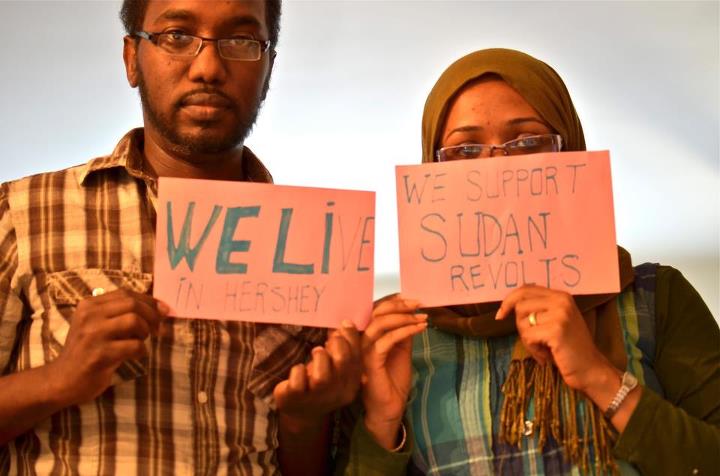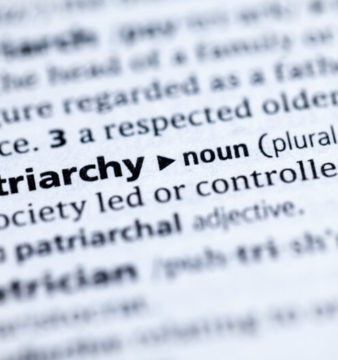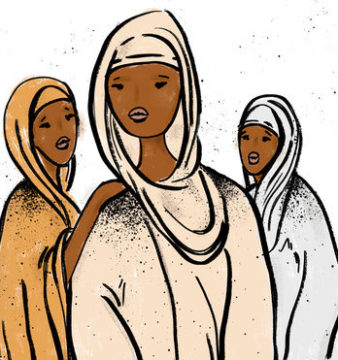Sudan e-Revolts
The case of the Sudanese Revolution is a peculiar one. There are tens of thousands of young men and women from Sudan who are active in the social media scene. I am one of them. Our Facebook pages are cluttered with posts of articles that denounce the regime and glorify the resistance. We tweet the latest gossip about the events on the ground and spread the hottest videos and pictures of the action that takes place at the universities on weekdays and around the mosques on Fridays. I am calling this revolution of ours ‘The e-Revolution’.
An oblivious observer will call this cowardice and lack of determination. I beg to differ. History has shown that the people of Sudan have earned their fair share of courage among humanity. Just ask the British colonialists and the security apparatuses of ex-presidents Ibrahim Abboud and Gaafer Nimeiry. The people of Sudan have shown that when they believe in a cause, then neither rubber bullets nor real bullets can dissuade them. Omer al-Bashir tapped into this notion to execute his campaign in South Sudan back in the nineties. He was successful.
But while al-Bashir succeeded in convincing his young fighters to stop the bullets with their bare breasts, the revolution leaders failed, so far, to persuade the Facebook dwellers to abandon their keyboards and take to the streets. While most of these youngsters fully appreciate the severity of the economic slump and the magnitude of the regime’s dysfunction, they cannot escape the realities on the ground. On the ground, there’s a suggested possibility of an implosion brought about by the void that may overwhelm a fragile state; one that boasts three armed rebellions and a deadly border dispute with its new southern neighbour. This is compounded by the existence of the incompetent opposition parties that are lurking with the hope of nabbing the revolution in a blink of an eye.
From my interaction with the people interested in the recent revolts, I found that the political mood is divided into three broad groups. At the far end of the spectrum, we find a group that strongly believes in the revolution methodology and are willing to expend their wellbeing and freedom to see the birth of a third uprising. On the other end, we find a contrast group that, for one reason or another, see al-Bashir as the best man for Sudan. And then there are the mainstream groups that understand the need for change, but fear that the risk may outweigh the faint prospects of progress. After all, optimism needs to keep track of reality.
As the one-month anniversary of the revolt has passed, activists and opposition parties continue to plead their case and organize their Fridays with extraordinary resolve. In the meanwhile, the keyboard activist will keep posting, liking and tweeting without taking to the streets, hoping that this balancing act will silence their confusion between the two evils.






Cheers for you!!! But Allah, crackers won’t give a damn.
I don’t understand what’s evil about so called keyboard activists not taking to the streets. U r conflating domestic Sudanese with a twitter community largely living all over the world. Besides, This revolution is more than just young twitter activists living abroad. There are domestic professional networks that have hardly responded. What of them?
There’s also a signature passiveness in this column that alludes to support for the ncp. Namely u fall into the fallacy of siege thinking: that the ‘real’ Sudan is under threat from the periphery; the center must control power at the risk of uncertainty. What this perspective fails to realize is that we are all Sudanese and grievances that the traditionally power-marginalized periphery hold are valid. Another fallacy is that the periphery is the cause of the uncertainty! Not necessarily the ncp’s policy of marginalization and brute politics. Again signature thoughts from many Sudanese under arrest of action rather than tempered and calculated action
Mr/Ms Cordoned
What Osman is stating here is merely a fact. That the vast majority of this ‘revolution’ is cyber, regardless of where they are (Sudan or abroad). Also, the fact that indeed the revolution leaders did not succeed in drawing people away from their computers and to the streets, which I personally blame on a lack of organization rather than anything else. The proposed 30th of June as the end of the regime went nowhere simply because there was no actual agreement on where and when to meet and rally. You can’t expect people to just roam the streets and try and overthrow the government in this fragmented and primitive manner. I don’t know where you get the impression of this ‘passive support of the NCP’ that you refer to, nor the idea about centralization of power being necessary. It’s more of a reference to an area where the NCP has succeeding using what we should be using so as not to fail.
Ms Reem Gaafar,
In reading his tone and language, his column is sending mixed messages. We don’t know in what capacity he presents his criticisms. Is he neutral? Is he pro-NCP? Is he pro-Elbashir? Is he anti-rebels? Is he pro-“activism”? Though critical, he’s largely ambivalent and anti-constructive. And there is nothing in his column that is condemning of the NCP or Elbashir. Not one point he makes. He calls us “keyboard activists” and calls Bashir’s supporters “young fighters.” There’s a tone of condescension in this column which I take strong exception to.
He’s not merely presenting facts. He’s denigrating the efforts of hundreds of what he calls “keyboard activists” as well as regular Sudanese revolutionaries (although the revolts were more than just the cause of so called “activists”…. and one wonders who calls themselves activists when we are simply echoing the the symbols of freedom.) Also, his analysis doesn’t put much onus on regular citizens and common people. What of their decisions? Instead, he blames the lack of ‘organization’ squarely as you do! No one wants to take self-responsibility. Instead, its easy to blame others for their “evils”. This is the kind of kickdown syndrome that exists in Sudan. No one’s able to say “good job in these points, but maybe consider trying this; and if not good luck! Great job.” Meaning his input is largely passive and neutral but eerily supportive of Elbashir.
Personally, from reading this column, I found it disrespectful. I expect more from someone who wants to contribute criticism in ‘neutral’ fashion. And so should all of us Sudanese. We need cogent arguments.
First the column presents a very accurate and constructive thesis, that we must encourage people to both tweet and get to the streets; Second, he lauds past revolutions (anachronism); In the third paragraph, he presents the overarching wisdom behind not revolting and that current conditions are too unstable and the future is unpredictable because of the ongoing periphery instability (a fallacious thinking which largely is his core political perspective and main delivery in this column/ and i attack this notion squarely. i charge it is not the peripheral instability that is the root problem. It is the NCP that is the root problem. you either agree with this, or you don’t); Fourth paragraph: he presents the political spectrum — those who want change, those who don’t want it, and those who “understand it” but lean on no change for the time being ( Forget mass arrests. Forget the torture of men and women who have been raped or abducted. Forget all that). Then his last paragraph, which starts off well but ends in the typical Sudanese negging fashion I have come to observe from the vast citizen body. He calls tweeters in a state of “confusion” and between two evils. Which two evils? If you look at the dichotomy he presented earlier, he presents two contrasting groups: 1) those for revolution, 2) those against revolution. What is “evil” about wanting change through revolution? Are we not championing democracy? He chose his words. My point is, choose your words wisely, for they reveal your core sentiments. His is a hard-nosed elitist establishment view held by many in Khartoum. I have family in Khartoum as well as other areas. And Khartoum has one of the most obstructive elitist establishments I have ever encountered.
I am a big proponent of clarity of thought and positions. We have no time for people who sit on the fence on these matters. This column presents words and language which is not truly supportive of the revolution. These are ambivalent words that obfuscate what clearly most tweeters want: Freedom and Democracy in Sudan. Who is he calling confused? Tweeters? Which ones? The ones in Sudan? The ones abroad who have the time and energy to expend for the love of their country? Pay some dues man. There have been reports that young men are living in real fear of being arrested. Others in detention have being “flashed” with male genitalia by security personnel. This is a real fear. show some respect. encourage people, don’t patronize or insult them. Be fair. Be generous to your countrymen and women rather than constantly reminding them of their shortcomings. You think its a lack of organization or mass fear that prevents change from happening? Have you seen the videos? read the articles. Sure, there are political divisions but do you really think the Elbashir’s government has the same standard as Nimeiri? Again, fallacious thinking… thinking that today is no different from 20 years ago? The Sudanese know revolution, its in their blood so they can do it whenever they want. Give your people more credit. There’s a more ‘in tune’ feeling going on here from the majority than merely acquiescing because of ‘current political instabilities.’ People are genuinely afraid. We all are.
Cordoned,
Thank you for your inputs. The arguments compiled in this article are the results of various discussions I had with a good number of active social media members. I am neither promoting their opinions nor condoning their thought methodology. I am rather presenting it as is and then trying to establish a correlation between their online activism and their offline slacktivisim in light of the dilemmas presented above (siege mentality as you refer to it). Whether siege mentality is a valid defense or not is not for me to judge.
I do understand that you demand me encourage and cheer the revolution, but I do not think I can be more persuasive or more propelling than the current economic crisis. If it is fear of persecution that inhibits the revolt then the cause did not reach the threshold of desperation and I find it inappropriate for me to tilt that balance one way or the other. I do believe that the people should make that transition and gauge the balance at their own will. Any thing else would be shear arrogance and severe lack of respect for their intellectual capacity from my part.
Some may believe that such a position is equivalent to standing on the fence. I will counter by saying that the field center position is relative to where you perceive your goal to be. My goal is to provide a fresh view point that helps the activists realize progress. Unfortunately, a good number of them see anything other than echoing their views, retweeting their tweets and liking their posts is off field. I do understand this fact and I am willing to live with being an outcast if that was the cost of holding to my ideas. This is after all what we call for: Freedom of thought and speech.
Regard,
Osman